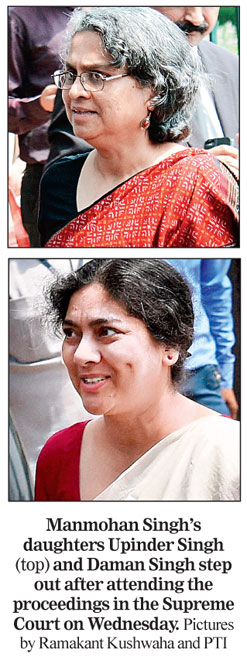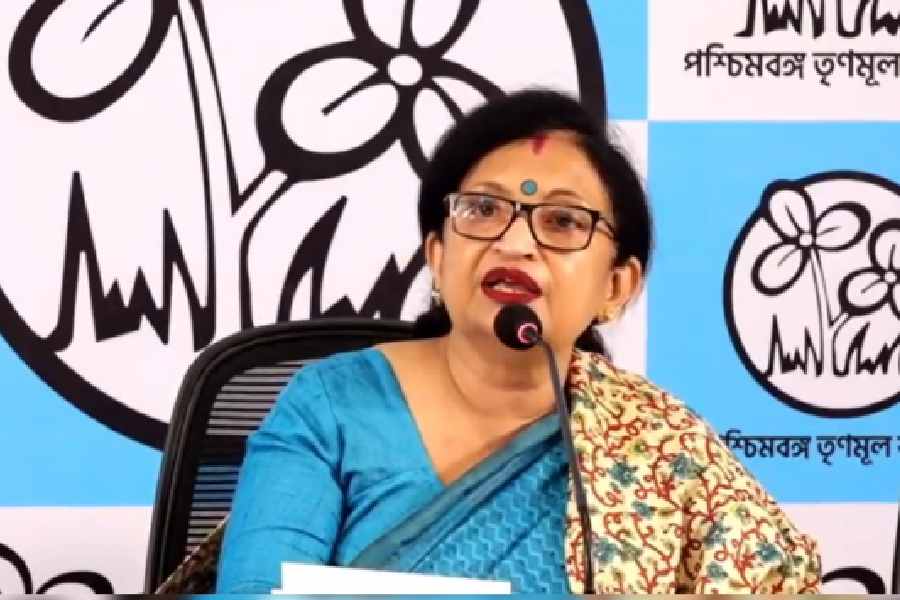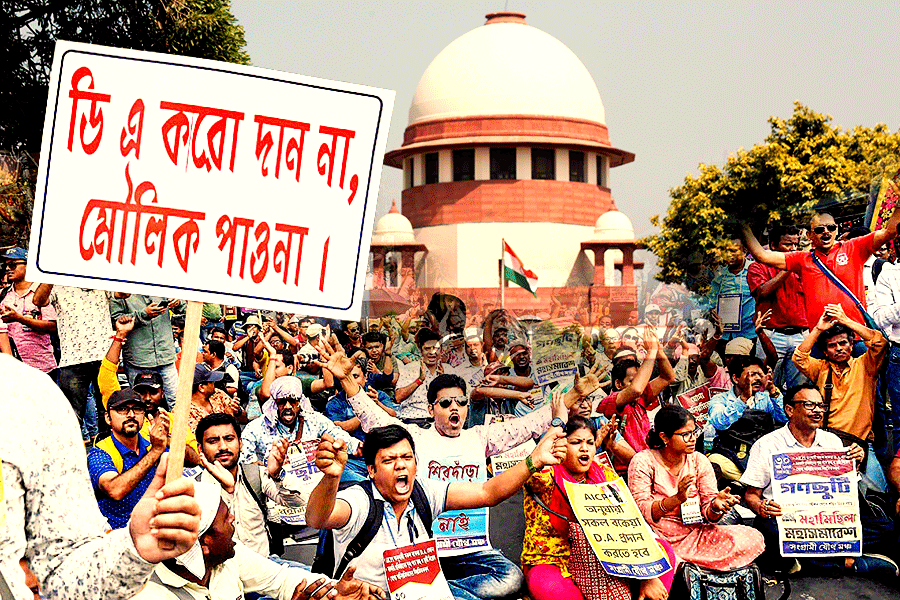New Delhi, April 1: In the jam-packed Hall No. 9 of the Supreme Court this morning, two figures stood out for their composure.
Upinder Singh and Daman Singh were there to find out whether their father would have to appear before a special court seven days from now.
So were the others - mostly lawyers unconnected with the case and court officials - because Item No. 33 dealt with Manmohan Singh, the former Prime Minister.
The Supreme Court eventually stayed indefinitely the proceedings in a lower court against Singh in the coal-block allocation case.
But around 10.30am, when the courtroom began filling up, tension was writ large on the faces of Kapil Sibal, K.T.S. Tulsi, Abhishek Manu Singhvi and Harish Salve, all senior counsel who have fought many a trench battle on the legal frontline. The first three were appearing for Manmohan while Salve was representing Kumar Mangalam Birla.
 At 11am, the bench headed by Justices V. Gopala Gowda and C. Nagappan commenced the hearing.
At 11am, the bench headed by Justices V. Gopala Gowda and C. Nagappan commenced the hearing.
Perched in a corner of the visitors' gallery were Upinder and Daman who appeared more calm and composed - traits that evidently run in the family - than some of the lawyers. Amrit Singh, the third daughter of Manmohan, is a human rights lawyer based in the US.
The two ladies had walked in unobtrusively, accompanied by a police officer in civvies and a Supreme Court registry officer. When the order staying the summons was issued by the bench around 11.30am, the two siblings clasped their hands together and left the court hall. The exit, too, was as self-effacing as the entry.
As no date had been fixed for the next hearing, today's order would continue indefinitely until further orders. The bench also stayed the summons issued by special judge Bharat Parashar to Birla, then coal secretary P.C. Parakh and two senior executives of Hindalco.
The court issued notices to the Centre and the CBI for their response on the petitions filed by Manmohan and others.
The bench issued a separate notice to the Centre and the investigating agency on another petition filed by Hindalco Industries challenging the constitutional validity of Section 13(1)(d)(iii) of the Prevention of Corruption Act relating to "criminal misconduct by a public servant".
The former Prime Minister and the others have been summoned under various IPC provisions and this particular section.
The section says that "a public servant is said to commit the offence of criminal misconduct if he, while holding office as a public servant, obtains for any person any valuable thing or pecuniary advantage without any public interest...."
A petition filed by Hindalco said the provision "criminalises an exercise of discretion by a government servant without any further requirement of mens rea (guilty intention), dishonestly, quid pro quo or illegal gratification on the part of the public servant".
"The provision also impinges on the fundamental right to carry on business by criminalising legitimate business activities," it added.
Representing Manmohan, Sibal assailed the summons issued by the trial judge on March 11, which was preceded by the judge's rejection in December 2014 of the CBI's closure report on the issue.
The special CBI court had said concerted conspiracy was hatched "to extend undue benefit/wrongful gain to Hindalco" (a company owned by Birla) while at the same time "causing wrongful loss to the Government of India" and the public sector Neyveli Lignite Corporation (NLC).
"What is the illegality in the act of the petitioner (Manmohan)? There is nothing illegal to allot mines. Nothing contrary to statute, there is no statutory prohibition. If you do not accept the guidelines, it is not illegal, what is the illegality?" Sibal contended before the bench.
He pointed out that the trial judge in his summoning order had clearly stated that there was "no mens rea" against Singh and the others summoned. Yet, the judge had proceeded to summon them.
"Can't the Prime Minister decide on the guidelines? Where is the sanction under 197 CrPC (as required for prosecution of a public servant)?
"What is the common meeting of minds? Where is the alleged act? If I (Manmohan) do not accept the screening committee report, does it become an illegal act?" Sibal asked the court, while reading out a portion of the special judge's order.
Justice Nagappan remarked: "Instead of allocating the coal block to Neyveli Lignite Corporation as per the screening committee recommendations, you (Manmohan) allotted it to a private company. You also reviewed your own order on the basis of the Odisha chief minister's letter."
Sibal said the total allocated block capacity is 507 MT of which 70 per cent was allotted to Mahanadi Coal Fields, 15 per cent to NLC and only the balance was allotted to Hindalco.
"Every day as a minister I review my own decisions. Even assuming as a Prime Minister, under the business rules I am entitled to call for all files," Sibal said.
Justice Gowda said: "The judge (trial court) says as coal minister you have taken a decision and not as Prime Minister."
Sibal asked: "What is wrong in reviewing? There is no criminality. It is a compelling public interest (allocation). I also review my decisions. Merely because I reviewed my decisions, should it be held against me?... Even Mahatma Gandhi had said that I change my opinion every few years."
Justice Nagappan said: "There is a finding that you have violated the recommendations of the screening committee."
Sibal said: "While quashing the coal block allocations, this court held that the proceedings adopted by the screening committee is not correct. But the trial judge found fault with the Prime Minister for not following the procedure."
The court later said in a written order: "Since we had admitted the petitions, prima facie we feel the order impugned is required to be stayed. Accordingly, we stay all further proceedings arising out of this order."










